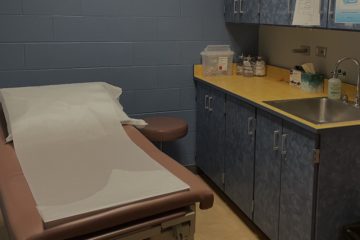Adam Culver, a teacher at Cabell County’s alternative learning school, has seen more students filling the seats in his school in the last few years.
While the school had typically served kids who were in danger of expulsion and facing serious discipline, Culver said poor behavior has had little to do with the spike in students.
Instead, Culver said the county’s kids are struggling emotionally and mentally in school in the wake of the COVID-19 pandemic.
“A lot of it seems to be about coping mechanisms,” said Culver, who has taught in Cabell schools for 15 years and now teaches English at Crossroads Academy. “I was (at Crossroads) for about a year before Covid started, so I worked in this environment before. There’s been a huge increase in students who are really struggling with social cues and norms.”
There can be a delay in getting kids help they need, he explained, because of a lack of infrastructure in the state for addressing kids’ mental health.
And, Culver stressed, “The vast majority of our students have experienced some sort of trauma.”
After three years of pandemic-induced stress, medical and education experts are turning their attention to the country’s kids, who have seen a sharp increase in mental health issues. Data that would give a full picture of West Virginia kids’ mental health and treatment options is hard to come by, but national data paints a grim picture.
“Children in America are in the midst of a mental health crisis, struggling with anxiety and depression at unprecedented levels,” The Annie F. Casey Foundation wrote while releasing its 2022 KIDS COUNT Data Book. The number of children ages 3 to 17 struggling with anxiety or depression rose by 1.5 million between 2016 and 2020, according to the report.
Recently, the American Academy of Pediatrics and more than 130 organizations urged President Biden’s administration to declare a national emergency in children and teens’ mental health. The group cited that “emergency room visits for youth suicide attempts have increased dramatically and eating disorder visits doubled during the pandemic.”
Christy Day, spokeswoman for the West Virginia Department of Education, said the department had “no formal documentation” of mental health issues since the pandemic, though, Day noted in an email, “school staff have reported a rise in anxiety, behavior/discipline issues and educator stress.”
Not every school is staffed with a full-time therapist or social worker, and Day explained the WVDE only tracks mental health issues in schools in six counties that have been granted funding through a grant from the Substance Abuse and Mental Health Services Administration.
The state doesn’t publicly report emergency room data, which could also shed light on how many kids are struggling with mental health issues and accessing emergency rooms for acute mental health care. Nationally, these numbers have spiked during the pandemic, and the wait times for care have increased, too. Kids and their caregivers find themselves in “medical purgatory” as they wait in an emergency room to be transferred to an open bed in an adolescent mental health facility.
Danielle Lish is a social worker who provides therapy to kids in the state’s upper panhandle. She has seen an increase in the number of clients in need of emergency mental health care; these kids end up in the emergency room for days because there’s nowhere to send them in the state, she said.
“No matter how hard the social worker and nurses are working, they just don’t have a bed,” Lish said. “The hospital stay devastates the kids’ mental health. They’re in a crisis, and they’re experiencing very serious symptoms, and they’re being told, ‘just to wait here.’”
Lish called on state lawmakers to pay attention to adolescent mental health. “A lot of times symptoms of anxiety and depression are written off as normal teen experiences, and that’s not the case,” she said.
At the national level, U.S. Senators Joe Manchin (D-W.Va.) and Shelley Moore Capito (R-W.Va.), announced $5.8 million from a U.S. Department of Education program to increase school-based mental and emotional health services for West Virginia students.
According to Day, the WVDE has launched a number of initiatives (funded by state and federal dollars) aimed at improving mental health and giving educators resources to support students. These resources include the West Virginia Expanded School Mental Health, a partnership between state agencies and the Marshall University School of Medicine to expand access to mental health services for all students. Additionally, Day said 20 counties used $16 million in Elementary and Secondary School Emergency Relief Funds to address mental health services and supports.
The West Virginia Department of Health and Human Resources recently launched weekly confidential online sessions for parents and caregivers looking for help navigating child mental health care.
About this project
The growing concern over student mental health reiterates why it would be helpful to have West Virginia’s pediatric emergency room data as a measuring stick for how the state’s hospitals are responding to kids in need of acute mental health care.
As I introduced in my first blog for this series with Think Kids WV, I am seeking to collect pediatric emergency room data from hospitals around the state. Other states, like Virginia, do report this data; it provides a look at how many kids are accessing emergency rooms for mental health care, how long they’re spending there before receiving the care they need and what kind of care they receive. West Virginia does not make this data publicly available, which I confirmed with the West Virginia Department of Health and Human Resources.
Data collected would be shared publicly. I’ll share my efforts and outcomes in this series through the end of the year.
We’re looking to tell the stories of families who are in need of or have experienced adolescent mental health care in West Virginia. We’d also love to hear from school personnel and mental health services providers about kids’ mental health. Contact Amelia Ferrell Knisely at ameliaferrellnews@gmail.com or 304-208-1823.
If you need help
From parenting support to immediate crisis response, contact 1-844-HELP4WV to talk to a trained helpline specialist who can help you understand options and link you directly to treatment providers. The resource is available 24/7.
You can allso get immediate help 24/7 from the National Suicide Prevention Lifeline at 1-800-273-8255.
The West Virginia Department of Health and Human Resources recently launched weekly online sessions for parents and caregivers looking for help navigating child mental health care.

Amelia Ferrell Knisely is an award-winning journalist in West Virginia. Originally from Rand, West Virginia, she has written for Mountain State Spotlight and the Charleston Gazette-Mail about child welfare, hunger and poverty. Ferrell Knisely also previously worked for The Tennessean in Nashville. Follow her on Twitter.



0 Comments